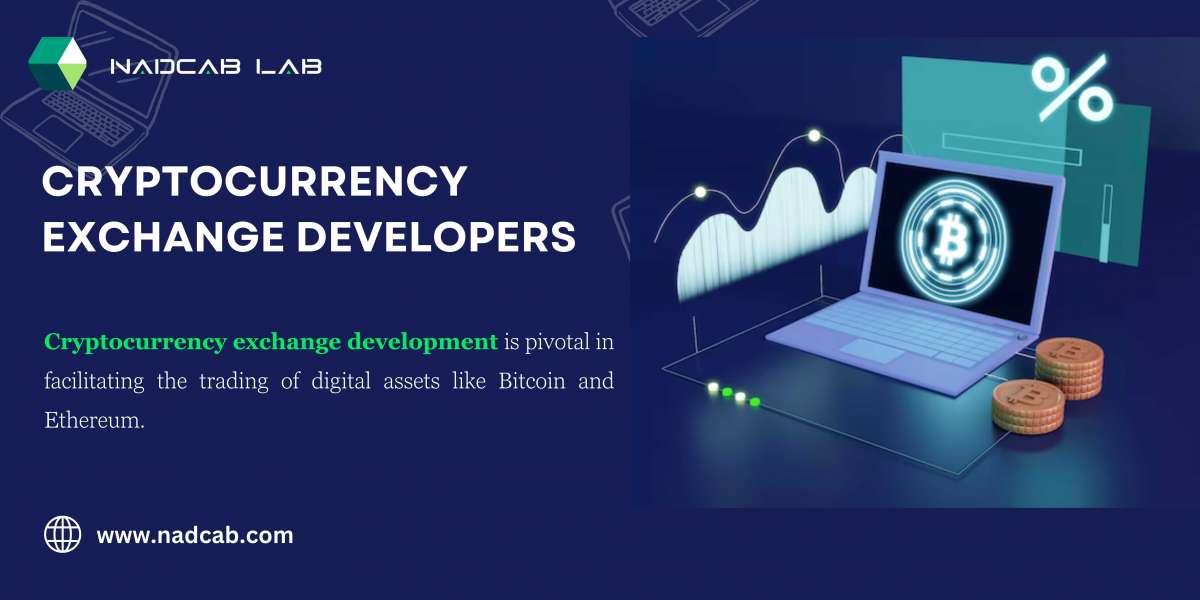Introduction :
The world of cryptocurrency is constantly evolving, and with it, so are the services that support it. Cryptocurrency exchange development is at the forefront of this transformation, offering innovative solutions and features to cater to the growing demands of the digital asset market.
One prominent trend is the rise of decentralized exchanges (DEXs), which offer enhanced security and user control. DEXs enable peer-to-peer trading and reduce the need for intermediaries. Another trend is the increasing integration of blockchain technology, ensuring transparency and immutability of transactions. Cross-chain compatibility, allowing different cryptocurrency exchange development to interact seamlessly, is also gaining traction.
Furthermore, security measures are advancing, with a focus on combating fraud and hacking attempts. Regulatory compliance and KYC/AML procedures are becoming more robust, improving trust and legitimacy in the industry.
What is Cryptocurrency Exchange Development Services?
Cryptocurrency exchange development services refer to the specialized offerings provided by companies and experts to create, launch, and maintain platforms for trading digital assets. These services encompass a wide range of technical and operational aspects, including platform architecture, security protocols, user interface design, and regulatory compliance. Developers in this field employ blockchain technology to facilitate the seamless exchange of various cryptocurrencies, ensuring a secure and transparent environment for users to buy, sell, and trade digital assets. They also implement features like order matching, wallet integration, and liquidity management to enhance the functionality of the exchange.
Additionally, these services often involve robust security measures to safeguard against cyber threats and fraudulent activities. Overall, cryptocurrency exchange development services play a crucial role in enabling the functioning of cryptocurrency markets, offering tailored solutions to meet the evolving needs of both businesses and individual traders in the dynamic world of digital finance.
Traditional Exchanges:
- Centralization: Traditional exchanges are centralized, meaning they operate as intermediaries between buyers and sellers. They maintain control over users' funds, acting as custodians.
- Regulation: Many traditional exchanges comply with existing financial regulations, requiring users to undergo Know Your Customer (KYC) and Anti-Money Laundering (AML) checks.
- Fiat Support: Traditional exchanges often allow the trading of cryptocurrencies against fiat currencies, such as USD or EUR.
- Liquidity: They typically offer high liquidity due to their large user bases and institutional participation.
- Security: Security is a concern, as centralized exchanges are vulnerable to hacks and security breaches.
Modern Exchanges:
- Decentralization: Modern exchanges, like decentralized exchanges (DEXs), operate on blockchain technology, eliminating the need for intermediaries. Users have full control of their funds.
- Regulation: Many DEXs operate with minimal regulatory oversight, offering a more privacy-focused and pseudonymous trading environment.
- Fiat Support: DEXs usually don't support direct fiat-to-crypto trading, relying primarily on cryptocurrency pairs.
- Liquidity: Liquidity on DEXs may be lower compared to traditional exchanges, but it's improving as more users adopt decentralized trading platforms.
- Security: DEXs prioritize security through blockchain technology, reducing the risk of hacks and ensuring transparency.
Blockchain Technology in Exchange Development
Blockchain technology plays a pivotal role in revolutionizing exchange development. It serves as the foundational framework for creating secure, transparent, and decentralized platforms for trading digital assets. Here's how blockchain impacts exchange development:
- Immutability and Transparency: Blockchain's distributed ledger ensures that once a transaction is recorded, it cannot be altered. This feature instils trust among users, as all transaction history is transparent and verifiable.
- Smart Contracts: Smart contracts, self-executing code on the blockchain, automate various functions within an exchange, such as trade execution, settlement, and fund transfers. This reduces the need for intermediaries and enhances efficiency.
- Security and Trust: Blockchain's cryptographic techniques and consensus mechanisms make it highly secure. This significantly reduces the risk of fraud, hacking, and unauthorized access to user funds.
- Decentralization: Blockchain enables the creation of decentralized exchanges (DEXs), where users retain control of their funds and trade directly with one another. This eliminates the need for a central authority and reduces counterparty risk.
- Cross-Chain Compatibility: Blockchain technology facilitates interoperability between different blockchain networks. This allows for the seamless exchange of various cryptocurrencies, enhancing the versatility of the exchange platform.
Security Measures in Cryptocurrency Exchanges
Ensuring robust security is paramount in cryptocurrency exchanges to safeguard users' funds and data. Here are key security measures implemented in exchanges:
- Two-Factor Authentication (2FA): Enabling 2FA adds an extra layer of security by requiring users to provide a second form of authentication (like a code from a mobile app) in addition to their password.
- Cold Storage: Many exchanges use cold wallets (offline storage) to store a significant portion of users' funds. This keeps them protected from online hacking attempts.
- Hot Wallet Security: For liquidity and operational purposes, exchanges maintain a smaller portion of funds in hot wallets (online storage). Implementing multi-signature authentication and secure private key management is crucial for their safety.
- Encryption: Data transmission and storage are encrypted to prevent unauthorized access. This applies to user credentials, transaction information, and personal data.
- Firewalls and DDoS Protection: Robust firewalls are set up to shield against cyberattacks. DDoS (Distributed Denial of Service) protection ensures uninterrupted service during high traffic periods.
- Regular Security Audits: Exchanges undergo frequent security audits by independent third-party firms to identify vulnerabilities and ensure compliance with best practices.
Emerging Trends in Cryptocurrency Exchange Development Services
The landscape of cryptocurrency exchange development is witnessing dynamic shifts driven by technological advancements and evolving user demands. Several key trends are shaping the future of exchange services:
- Decentralized Finance (DeFi) Integration: Cryptocurrency exchanges are increasingly incorporating DeFi protocols, allowing users to access a wide array of financial services directly from their exchange accounts. This includes lending, borrowing, and yield farming, offering a comprehensive financial ecosystem.
- Non-Fungible Tokens (NFTs) Integration: With the surge in popularity of NFTs, exchanges are adapting to facilitate the trading and exchange of these unique digital assets. This trend is giving rise to specialized NFT marketplaces within exchanges.
- Layer 2 Solutions: To address scalability issues and reduce transaction costs, exchanges are adopting Layer 2 solutions like sidechains and rollups. These technologies enhance the efficiency and speed of blockchain transactions.
- Cross-Platform and Cross-Chain Trading: Modern exchanges are focusing on interoperability, allowing users to trade assets seamlessly across different blockchains. This trend enables a more interconnected and versatile trading experience.
- Security Token Offerings (STOs): As regulatory frameworks around security tokens continue to mature, exchanges are gearing up to facilitate compliant STOs. This trend brings a new dimension to asset tokenization and trading.
- Artificial Intelligence (AI) and Machine Learning (ML): AI and ML algorithms are being employed to enhance user experience, optimize trading strategies, and implement advanced risk management tools. These technologies are becoming integral components of exchange development.
- Regulatory Compliance Solutions: With increasing regulatory scrutiny, exchanges are investing in sophisticated compliance tools and solutions. These include advanced KYC/AML procedures and real-time monitoring to ensure adherence to legal requirements.
- User-Centric Interfaces: User experience design is becoming a focal point, with exchanges prioritizing intuitive interfaces, customizable dashboards, and enhanced charting tools to cater to both novice and experienced traders.
Conclusion
The landscape of cryptocurrency exchange development is undergoing a remarkable evolution, driven by several key trends. The ascent of decentralized exchanges (DEXs) signifies a shift towards user-centric platforms that prioritize security and autonomy. This departure from centralized models not only reduces reliance on intermediaries but also fosters a more robust and resilient ecosystem.
Moreover, the integration of blockchain technology stands as a testament to the industry's commitment to transparency and trust. This innovation ensures that transactions are recorded in an immutable ledger, instilling confidence in users and stakeholders alike.
The pursuit of cross-chain compatibility is another pivotal development, enabling seamless interaction between diverse cryptocurrencies. This breakthrough fosters a more interconnected and versatile crypto landscape.
Facebook - https://www.facebook.com/nadcablabs
Twitter - https://twitter.com/nadcablabs
Linkedin - https://www.linkedin.com/company/nadcablabs
Instagram - https://www.instagram.com/nadcablabs/
Youtube - https://www.youtube.com/@nadcablabs








